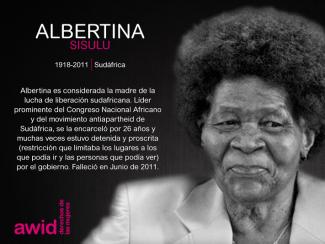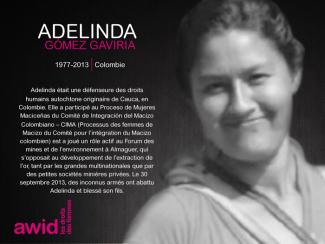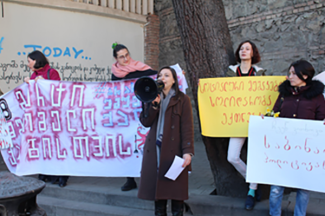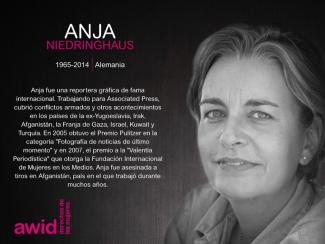
Albertina Sisulu

El Consejo de Derechos Humanos (CDH) es el cuerpo intergubernamental del sistema de las Naciones Unidas responsable de la promoción y protección de todos los derechos humanos en todo el mundo. El HRC se reúne en sesión ordinaria tres veces al año, en marzo, junio y septiembre. La La Oficina del Alto Comisionado para los Derechos Humanos (ACNUDH) es la secretaría del Consejo de Derechos Humanos.
Debate y aprueba resoluciones sobre cuestiones mundiales de derechos humanos y el estado de los derechos humanos en determinados países
Examina las denuncias de víctimas de violaciones a los derechos humanos o las de organizaciones activistas, quienes interponen estas denuncias representando a lxs víctimas.
Nombra a expertos independientes que ejecutarán los «Procedimientos Especiales» revisando y presentado informes sobre las violaciones a los derechos humanos desde una perspectiva temática o en relación a un país específico
Participa en discusiones con expertos y gobiernos respecto a cuestiones de derechos humanos.
A través del Examen Periódico Universal, cada cuatro años y medio, se evalúan los expedientes de derechos humanos de todos los Estados Miembro de las Naciones Unidas
Se está llevarando a cabo en Ginebra, Suiza del 30 de junio al 17 de julio de 2020.
AWID trabaja con socios feministas, progresistas y de derechos humanos para compartir conocimientos clave, convocar diálogos y eventos de la sociedad civil, e influir en las negociaciones y los resultados de la sesión.
The Nadia Echazú Textile Cooperative carries the name of a pioneer in the struggle for trans rights in Argentina. In many ways, the work of the cooperative celebrates her life and legacy.
Nadia Echazú had a remarkable activist trajectory: she was one of the co-founders of "El Teje", the first trans newspaper in Latin America, alongside Lohana Berkins, Diana Sacayán and Marlene Wayar. Nadia was part of the Argentinian Association of Travestis, Transexual and Transgender people (Asociación de Travestis y Transexuales de Argentina, ATTA) and founded The Organization of Travestis and Transgender People of Argentina (Organización de Travestis y Transexuales de Argentina, OTTRA).
Shortly after her death, her fellow activists founded the cooperative in her name, to honor the deep mark she left on trans and travesti activism in Argentina.

Described by the Guardian as one of Kiribati’s national icons, Teresia was a fearless advocate who worked closely with feminist groups in Fiji.
She used her research to address the issues of feminism and gender in the Pacific, as well as being co-editor of the International feminist Journal of Politics. Her influence spanned the academic frontier as well as social justice movements in the Oceania region.

Las propuestas de decrecimiento cuestionan la premisa de que la economía de los países debe ‘crecer o perecer’ y muestran la falsedad del lugar central que se le otorga al crecimiento medido por un aumento del Producto Bruto Interno (PIB).
Un modelo de decrecimiento propone un cambio hacia niveles de producción y consumo más bajos y sostenibles. En esencia postula una reducción del sistema económico para dejarle más espacio a la cooperación entre personas y a los ecosistemas humanos.
Esta propuesta incluye:
Las perspectivas feministas dentro de la teoría y práctica del decrecimiento sostienen que también es necesario redefinir y revalidar el trabajo no remunerado y remunerado, de cuidados y en el mercado, para superar los estereotipos tradicionales de género así como las brechas laborales y las desigualdades en el ingreso prevalecientes que devalúan el trabajo de cuidado.

Sindicato Red de Solidaridad

Não, apreciamos o seu trabalho, mas, de momento, não solicitamos respostas de indivídues.
Stella comenzó su carrera en el Ministerio de Género y Desarrollo Comunitario en Uganda colaborando con lxs legisladores en reformas legales, incluida la Constitución de Uganda de 1995, que estableció algunas de las reformas más progresistas para las mujeres en la región.
Stella es respetada y admirada en toda la región por sus incansables esfuerzos para crear y hacer cumplir leyes y políticas que tomen en cuenta cuestiones de género. También desempeñó un papel clave en la redacción de la Ley de Violencia Doméstica de Uganda y en la movilización de apoyo para las constituciones sensibles al género tanto en Uganda como en Ruanda.
A través de su trabajo con el Centro Internacional para la Investigación sobre la Mujer (ICRW, por sus siglas en inglés), abordó la violencia contra lxs niñxs y trabajó para fortalecer las capacidades de las organizaciones de base que abordan la violencia de género. Stella fue profesora en cursos sobre derechos de género y la ley, en la Universidad Makerere, y formó parte de las juntas directivas de Akina Mama wa Afrika, ActionAid International Uganda y Open Society Initiative para África Oriental.

Lxs actores ultra conservadores han desarrollado una serie de discursos en la esfera internacional de los derechos humanos. Utilizan argumentos que manipulan la religión, la cultura, la tradición y la soberanía nacional para minar los derechos relacionados con el género y la sexualidad.
Lxs actores anti-derechos se han alejado cada vez más del lenguaje explícitamente religioso. Vemos que actores regresivxs —que antes tal vez ridiculizaban los conceptos de derechos humanos — ahora los manipulan y cooptan para promover sus propios objetivos.
Este discurso emergente y exitoso parece inocuo, pero resulta útil como un tema ‘sombrilla’ bajo el que se cobijan múltiples posiciones patriarcales y anti-derechos. Por eso el tema de la «protección de la familia» resulta un ejemplo clave que muestra la tendencia de lxs actores regresivxs a llevar adelante una incidencia integral e integrada.
El lenguaje de la «protección de la familia» opera desplazando al sujeto de los derechos humanos, reemplazando al individuo por instituciones ya poderosas. También afirma una concepción unitaria, jerárquica y patriarcal de la familia que discrimina a todo formato familiar que esté fuera de estos límites rígidos.
Por último, intenta cambiar el enfoque del reconocimiento y la protección de los derechos de integrantes vulnerables de la familia a la no discriminación, la autonomía y la ausencia de violencia en el contexto de las relaciones familiares.
La Santa Sede y varios grupos de la derecha cristiana buscan apropiarse del derecho a la vida para ponerlo al servicio de su misión contra el aborto. Mezclando el lenguaje de los derechos humanos con la doctrina religiosa conservadora, argumentan que el derecho a la vida, tal como se lo establece en la Declaración Universal de Derechos Humanos y en el Pacto Internacional de Derechos Civiles y Políticos, se aplica a partir del momento de la concepción.
Ningún instrumento universal de derechos humanos apoya ese argumento. Sin embargo, esta es una táctica atractiva para lxs actores anti-derechos, porque el derecho a la vida no puede ser violado bajo ninguna circunstancia y es un estándar legal vinculante.

Lxs actores anti-derechos humanos utilizan una serie de dispositivos retóricos en su campaña para minar los derechos sexuales: sostienen que estos derechos no existen o que son «nuevos derechos»; que causan daño a las niñas, los niños y la sociedad; y/o que se oponen a la cultura, la tradición o las leyes nacionales.
Lxs actores conservadores dedicados a hacer incidencia en la ONU atacan el derecho a una educación sexual integral (ESI) desde varios frentes. Afirman que viola los «derechos parentales»; que perjudica a las niñas y los niños; y que no es educación sino adoctrinamiento ideológico.
También alegan que poderosos grupos de presión les imponen la Educación Sexual Integral a las niñas y los niños, los padres y las Naciones Unidas para beneficiarse de los servicios que estos mismos grupos proporcionan a niñas, niños y jóvenes.
Los intentos de invalidar los derechos relacionados con la orientación sexual y la identidad de género se han multiplicado. Lxs actores ultra conservadores argumentan que aplicar los principios y leyes históricos de derechos humanos a esta temática equivale a crear «nuevos derechos», y proponen un cambio radical en el significado actual de los derechos que resultaría de interpretarlos a la luz de la "cultura" o de las «particularidades nacionales».
Desde hace muchos años, las organizaciones de la derecha cristiana se movilizan en contra de los derechos reproductivos junto con la Santa Sede y otrxs aliadxs anti-derechos. A menudo argumentan que los derechos reproductivos no son más que una forma de control poblacional impuesto por Occidente sobre los países del Sur Global. Irónicamente, esta afirmación proviene a menudo de actores con sede en Estados Unidos y Europa Occidental, que en su mayoría trabajan activamente para exportar sus discursos y políticas fundamentalistas.
Lxs actores regresivxs también citan argumentos «científicos» de grupos de expertxs ultra conservadores y de fuentes que emplean metodologías de investigación poco sólidas, para sugerir que el aborto causa una serie de efectos secundarios psicológicos, sexuales, físicos y relacionales.
Así como lxs actores anti-derechos buscan construir una nueva categoría de «protección de la familia», también proponen otra: los «derechos parentales», que tampoco encuentra respaldo en las normas de derechos humanos vigentes. Este discurso paradójicamente intenta utilizar las protecciones de derechos que les corresponden a los niños y las niñas, tal como las expresa la Convención sobre los Derechos del Niño, para fundamentar el derecho de padres y madres a controlar a sus hijas e hijos y limitar sus derechos.
Cada vez más, lxs actores anti-derechos, están intentando infiltrar y subvertir los estándares y discursos desarrollados por defensoras de derechos humanos, como la violencia contra las mujeres.
En la Comisión de la Condición Jurídica y Social de las Mujeres y en otros escenarios, estos actores insisten en tratar esta forma de violencia como un concepto al que le adosan argumentos anti-derechos reproductivos y otros de cariz patriarcal. Lxs actores ultra conservadores, por ejemplo, han argumentado que las relaciones de pareja no tradicionales ni heteronormativas son un factor de riesgo para la violencia, y enfatizan que los padres son necesarios para proteger a las familias de la violencia.
La Santa Sede ha elaborado y sostenido una crítica al género, a la «ideología de género», lxs «radicales del género» y la teoría de género. Lxs actores anti-derechos a menudo leen el término ‘género’ como un código equivalente a ‘derechos LGBTQ’. La derecha religiosa utiliza el género como un concepto transversal que une muchos de sus discursos. Cada vez más, el pánico que generan en torno a este tema se concentra en la identidad de género y en los derechos de las personas trans.
Varios actores ultra-conservadores emplean el discurso de la complementariedad de los sexos. Estructuran su retórica en torno a una presunción de diferencia: se supone que los hombres y las mujeres tienen roles diferentes pero complementarios en el matrimonio, la vida familiar, y también en su participación en la vida comunitaria, política y económica.
La referencia a los roles «naturales» tiene por objeto rechazar los derechos humanos universales a la igualdad y la no discriminación. También se utiliza para justificar las violaciones de estos derechos por parte de actores estatales y no estatales, y el incumplimiento de las obligaciones del Estado en cuanto a eliminar los prejuicios y las prácticas basadas en roles estereotipados para hombres o mujeres.
Este discurso sugiere que organismos de la ONU o Estados que actúan a través de la ONU atacan injustamente a los gobiernos nacionales. Lo que se intenta aquí es desplazar el sujeto de los derechos humanos de la persona o sector marginado que sufre una violación de sus derechos a una institución poderosa y/o regresiva, el Estado, para justificar excepciones nacionales a los derechos universales o para apoyar la impunidad estatal.
Lxs actores anti-derechos han adoptado el discurso de la libertad religiosa para justificar violaciones a los derechos humanos. Se refieren a la libertad religiosa de una manera que contradice directamente el propósito de este derecho humano y entra seriamente en conflicto con el principio de la universalidad de los derechos.
Su argumento es que la libertad religiosa se ve amenazada y debilitada por la protección a los derechos humanos, particularmente aquellos relacionados con el género y la sexualidad.
Lo que se proponen instalar es que el derecho a la libertad religiosa tiene por objeto proteger a las propias religiones y no a las personas, que son quienes en verdad tienen la libertad de profesar o no distintas creencias. Sin embargo, el derecho internacional de los derechos humanos protege a lxs creyentes y no a las creencias, y el derecho a la libertad de religión, pensamiento y conciencia incluye el derecho a no profesar ninguna religión ni creencia así como a cambiar de religión o de creencias.
El despliegue de referencias a la cultura y la tradición para debilitar los derechos humanos, incluido el derecho a la igualdad, es una táctica común entre lxs actores anti- derechos. Presentan la cultura como algo monolítico, estático e inmutable, y a menudo la oponen a las «normas occidentales».
Las alusiones a la cultura por parte de lxs actores anti-derechos en los debates de política internacional tienen como objetivo debilitar la universalidad de los derechos, defendiendo un relativismo cultural que prevalece sobre las reivindicaciones de derechos o las limita. El uso de los derechos culturales por parte de actores regresivxs se basa en una tergiversación deliberada de la cultura como derecho humano. Los Estados deben velar por que no se utilicen actitudes tradicionales o culturales para justificar violaciones a la igualdad. Las normas de derechos humanos exigen acceso, participación y contribución igualitaria en todos los aspectos de la vida cultural para todas las personas, incluidas las mujeres, las minorías religiosas y raciales y las personas cuya identidad o expresión de género difieren de las normativas.
En espacios políticos internacionales, lxs actores anti-derechos manipulan cada vez más las referencias a los derechos humanos universales o fundamentales para revertir el significado de la universalidad de los derechos.
En lugar de utilizar el término ‘universal’ para describir todo el conjunto de derechos humanos indivisibles e interrelacionados, lxs actores ultra conservadores lo emplean para delimitar y describir un subconjunto de derechos humanos que ellxs consideran «verdaderamente fundamentales». Todos los otros derechos estarían sujetos a la discreción del Estado, serían derechos 'nuevos' u opcionales. Este discurso resulta especialmente poderoso ya que instala una categoría indefinida - lo «verdaderamente universal» - que queda abierta a interpretaciones cambiantes.


Ayant co-fondé le réseau Red de Mujeres Ixiles de Nebaj, une organisation de défense des droits des femmes autochtones, membre de l’Initiative mésoaméricaine des femmes défenseur-e-s des droits humains (IM-Defensoras en espagnol), Juana était actuellement membre de son conseil d’administration.
Elle était également sage-femme et mère de 7 enfants. Juana avait reçu des menaces de mort qui avaient été signalées au bureau du procureur. Juana est la troisième défenseure autochtone assassinée dans la région en 2018. L'Ombudsman pour le Guatemala a signalé qu'au total 20 défenseur-e-s ont été tué-e-s dans le pays cette année.
Juana Ramírez Santiago a été abattue par des assaillants non identifiés alors qu'elle traversait un pont à Nebak, Quiché, au Guatemala. Les enquêtes visant à identifier les auteurs sont en cours.

Notre nouveau rapport de recherche Le Diable est dans les détails aborde les lacunes du secteur du développement en termes de connaissance des fondamentalismes religieux et vise à améliorer la compréhension de la façon dont les fondamentalismes religieux entravent le développement et les droits des femmes en particulier. Il offre des recommandations aux acteurs-trices du développement quant aux manières d’éviter de renforcer les fondamentalismes par inadvertance et sur les stratégies pour les contrer. [CTA download link: Lire le document]
| Graphic1 | 1. Control of women’s bodies, sexuality, and choice are “warning signs” of rising fundamentalisms. |
| 2. Neoliberal economic policies have a particularly negative impact on women, and fuel the growth of religious fundamentalisms. | Graphic2 |
| Graphic3 | 3. Choosing religious organizations as default for partnerships builds their legitimacy and access to resources, and supports their ideology, including gender ideology. |
| 4.Everyone has multiple identities and should be defined by more than just their religion. Foregrounding religious identities tends to reinforce the power of religious fundamentalists. | Graphic4 |
| Graphic5 | 5. Religion, culture, and tradition are constantly changing, being reinterpreted and challenged. What is dominant is always a question of power. |
| 6. Racism, exclusion, and marginalization all add to the appeal of fundamentalists’ offer of a sense of belonging and a “cause”. | Graphic6 |
| Graphic7 | 7. There is strong evidence that the single most important factor in promoting women’s rights and gender equality is an autonomous women’s movement. |
Le Diable est dans les détails détaille les violations graves à l’encontre des droits humains, et ceux des femmes en particulier, légitimées par des fondamentalismes parrainés par les États ainsi que par des acteurs fondamentalistes non étatiques, tels que les milices, les organisations communautaires religieuses et les particuliers. Le renforcement fondamentaliste de normes sociales patriarcales régressives conduit à la montée de la violence contre les femmes, les filles et les femmes défenseuses des droits humains (WHRDs). La rapport met en avant ces éléments-clé pour comprendre et affronter la situation :
Les acteurs du développement sont en mesure de jouer un rôle important dans ce contexte. La capacité collective des acteurs du développement à reconnaître les fondamentalismes religieux et à les affronter de manière concertée est essentielle pour faire progresser la justice sociale, économique et de genre et les droits humains pour tous, dans un contexte de développement durable. En donnant la priorité à des partenaires progressistes dans le cadre de leurs activités, les acteurs du développement peuvent éviter d’octroyer des ressources ou de la légitimité aux fondamentalistes religieux. Les organisations de femmes ont de l’expertise sur le sujet et ont développé des stratégies pour lutter contre les fondamentalismes : Les acteurs du développement pourraient s’appuyer sur ces connaissances et s’engager à leurs côtés au sein de coalitions intersectorielles pour faciliter leur diffusion

